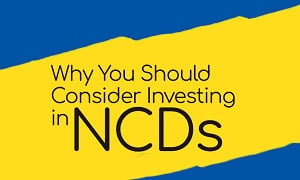 Zerodha (Trading & Demat Account)
Zerodha (Trading & Demat Account)
FREE Equity Delivery and MF
Flat ₹20/trade Intra-day/F&O
 Zerodha (Trading & Demat Account)
Zerodha (Trading & Demat Account)
FREE Equity Delivery and MF
Flat ₹20/trade Intra-day/F&O

|
|
Published on Tuesday, March 19, 2019 by Chittorgarh.com Team | Modified on Thursday, May 13, 2021

Non-Convertible Debentures (NCD's) are fixed income instruments used by companies to raise long-term capital from the public. They are known as non-convertible as these debentures cannot be converted into shares. NCD's offer a fixed rate of return to investors for a fixed period.
Here are the important points on non-convertible debentures:
NCD Public Issue (NCD IPO) is the process by which a corporate raises the NCD funds through the public. The process is similar to equity initial public offer (IPO) of private limited companies. One major difference in Equity IPO and NCD public issue is the bidding of NCD stops as soon as it is fully subscribed. The allotment is based on the first come first serve basis in NCD IPO.
| Parameters | NCD's | Fixed Deposits |
|---|---|---|
Issuing Entities | Corporates | Banks and Corporates |
Interest Rate | NCD's typically offer 2 to 2.5% higher returns than the bank FDs at any point in time. | |
Rate of Return (RoR) | RoR is 2 to 2.5% higher in NCD's than FDs | |
Tax Deduction at Source | NA | Applicable if gain exceeds Rs 40,000 a year. (Rs 50,000 in case of senior citizens) |
Liquidity | Low | High |
Maturity Period | 3-10 years | 7 days to 10-years |
Applicable Taxes | STCG and LTCG Tax | Interest is taxable as per your tax slab |
Non-Convertible Debentures are basically divided into two types; secured and unsecured NCD.
As the name suggests, you are comparatively on the safer side with secured instruments. They will provide assurance on repayment up to some extent if the company defaults. For example, Muthoot Finance LTD is planning to raise Rs. 100 crore through secured redeemable NCD's. The issue has opened on 14th Feb 2019 and is closing on 14th March 2019. As it is a secured NCD, it has a higher degree of safety on credit repayment.
On the other hand, unsecured debt offers a higher rate of returns than the counterpart. Unsecured NCD's involve comparatively higher risk over repayment when the company defaults. Taking the example of India Infoline Finance Limited, it has issued secured and unsecured NCD's to raise money. Based on the selection, it offers 9.50% to 10.50% coupon rates where the highest belongs to unsecured NCD with high-risk involvement.
The key difference between the secured and unsecured NCD's is that the former is supported by company assets. When the company defaults, the investor can claim money through the asset liquidation process.
The liquidity of NCD's is higher than the FDs because they are listed in the stock exchanges for trading.
Further, some NCD's also have put or call options to exit. With a call option, the investor can redeem the NCD before maturity. On the other hand, with the put option, the investors can sell the debentures to issuer before maturity at a predefined price.
Depending on holding time of NCD, the investor has to pay taxes accordingly. There is no tax Deducted at Source (TDS) on NCD's.
If you stay with non-convertible debentures till maturity, your gain will be included with the income and you will have to pay taxes as per your respective tax slab. As a result, for the investors with the highest tax slab, post-tax returns from the non-convertible debentures are lower.
Fo Redeeming the bond before a year, you have to pay Short Term Capital Gains (STCG) Tax as per the tax slab you fall into.
For investing over a year but redeeming before maturity, you have to pay Long Term Capital Gains (LTCG) Tax at 20% with indexation and 10% without indexation.
Coming to the NCD interest rate in India, it offers an interest rate higher than the fixed deposit of 5-years and more. In addition, interest rates are also affected by the following factors:
Unsecured NCD's offer a higher rate of return over the secured ones. Here you have to understand that the higher interest rates come with higher risk as well. So, it is wise to assess returns and risks before investing in an NCD.
Moreover, NCD's offer various options to take payout on a yearly, quarterly, monthly, weekly and cumulative basis. In the cumulative option, the interest is accumulated and paid on maturity. For the investors who are investing with the purpose of achieving a financial goal instead of regular income, the cumulative option is a good choice.
Summing it up, before purchasing an NCD, it is necessary to check the credit rating, NCD types, the rate of returns, applicable taxes, and exit options. Considering all the factors affecting an NCD will help you make an informed decision.


FREE Intraday Trading (Eq, F&O)
Flat ₹20 Per Trade in F&O
|
|
Can I subscribe as a safe investment ? Any risk or safe investment ? Interest amount Taxable or Tax free ?